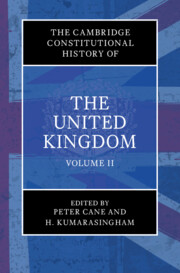Book contents
- The Cambridge Constitutional History of the United Kingdom
- The Cambridge Constitutional History of the United Kingdom
- Copyright page
- Contents
- Contributors
- Editors’ Preface
- 1 The Kingdoms of Anglo-Saxon England (450–1066)
- 2 England after the Conquest
- 3 England in the Thirteenth Century
- 4 England in the Fourteenth Century
- 5 England in the Fifteenth Century
- 6 England in the Sixteenth Century
- 7 The English Constitution in the Seventeenth Century
- 8 A European Perspective
- 9 Wales before Annexation
- 10 The Scottish Constitution before 1707
- 11 The Eighteenth-Century Constitution
- 12 The Constitutional and Parliamentary History of Ireland till the Union
- 13 The United Kingdom in the Nineteenth Century
- 14 The United Kingdom in the Twentieth Century
- 15 The Twenty-First-Century Constitution
- 16 Wales since the Annexation
- 17 Scotland in the Union
- 18 Ireland in the Union
- 19 The Making of Empire
- 20 Constitution and Empire
- Index
9 - Wales before Annexation
Published online by Cambridge University Press: 12 August 2023
- The Cambridge Constitutional History of the United Kingdom
- The Cambridge Constitutional History of the United Kingdom
- Copyright page
- Contents
- Contributors
- Editors’ Preface
- 1 The Kingdoms of Anglo-Saxon England (450–1066)
- 2 England after the Conquest
- 3 England in the Thirteenth Century
- 4 England in the Fourteenth Century
- 5 England in the Fifteenth Century
- 6 England in the Sixteenth Century
- 7 The English Constitution in the Seventeenth Century
- 8 A European Perspective
- 9 Wales before Annexation
- 10 The Scottish Constitution before 1707
- 11 The Eighteenth-Century Constitution
- 12 The Constitutional and Parliamentary History of Ireland till the Union
- 13 The United Kingdom in the Nineteenth Century
- 14 The United Kingdom in the Twentieth Century
- 15 The Twenty-First-Century Constitution
- 16 Wales since the Annexation
- 17 Scotland in the Union
- 18 Ireland in the Union
- 19 The Making of Empire
- 20 Constitution and Empire
- Index
Summary
In 1936, the writer J. R. R. Tolkien lamented in a lecture on the Anglo-Saxon work Beowulf that the ‘fairy godmother’ most visibly presiding over the poem’s interpretative fortunes was not, as one might have expected, Poesis but, rather, those honorable, but less directly to-the-point ministering spirits, Historia, Mythologia, and Philologia.1 Of course, these and other noble ladies had long guided the fortunes of a host of similar texts and disciplines. Particularly tenacious at the time Tolkien was writing – and it is worth remembering that he was born in South Africa in 1892 – was the grip maintained by that exacting mistress Teleologia on the field of English constitutional history.2 Stubb’s Select Charters was first published in 1870 and his Constitutional History in 1873; his influential writings traced the origins of representative government in England back to liberty-loving Teutons in the forests of ancient Germania. As late as the 1950s, the righteous – and implicitly racialized – inevitability of this line of descent was still being taught as history to English school children.3 Stubbs’s own works remained part of the Oxford curriculum through the 1970s. In like manner, historians working in the pre- and post-war periods, often from the lofty academic common rooms of All Souls College Oxford, charted the progress of colonial cultures from darkest ignorance to the light of self-governance under the benevolent guidance of Mother England. Westminster became in their works a model for human society as a whole, the telos of a new world order grounded in justice and fair play.4
Keywords
- Type
- Chapter
- Information
- The Cambridge Constitutional History of the United Kingdom , pp. 207 - 230Publisher: Cambridge University PressPrint publication year: 2023



